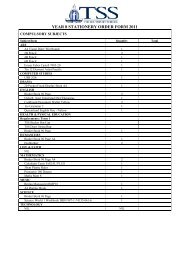About Boys - The Southport School
About Boys - The Southport School
About Boys - The Southport School
You also want an ePaper? Increase the reach of your titles
YUMPU automatically turns print PDFs into web optimized ePapers that Google loves.
We all need to feel that we belong.<br />
<strong>Boys</strong> in particular in the second<br />
and third stages of development<br />
begin to feel this need most<br />
keenly. Pollack calls this<br />
‘emotional connection’ - the<br />
need to find people who<br />
think and feel as we do<br />
and accept us by validating<br />
our feelings and experiences.<br />
Happily, most boys find these<br />
connections with friends,<br />
family members, teachers and<br />
coaches.<br />
Unfortunately, for some, the Boy Code<br />
and the mask of masculinity can distort<br />
these connections. <strong>The</strong> myths of what it is<br />
to be masculine which are fed to us in a variety of<br />
subtle and not so subtle ways cause some boys to develop<br />
inappropriate ways of belonging.<br />
<strong>The</strong>se are reflected in four general modes of behaviour.<br />
> “I belong when I am noticed and the centre of<br />
attention.” This belief leads to attention seeking and<br />
showing off. Many boys who hold this belief are incorrectly<br />
labelled A.D.H.D. A pattern of ignoring a boy until he<br />
breaks something, hits a sibling or ‘waves a flag’ in<br />
some other way, and then responding, will reinforce this<br />
attention-seeking behaviour.<br />
> “I belong when I am in control.” <strong>Boys</strong> who see<br />
only powerful men or who believe power and control<br />
to be defining male characteristics may demonstrate<br />
inappropriate behaviours based on power struggles. <strong>The</strong>ir<br />
self worth and sense of belonging is enhanced when they<br />
are in conflict with those they perceive to have more<br />
power. Typically they argue over the smallest issue or<br />
seem deliberately to provoke an argument. This may be<br />
done by engaging in an activity which they know will<br />
‘rattle the cage’ of parents and teachers or alternatively<br />
by failing to do something which is required of them.
















